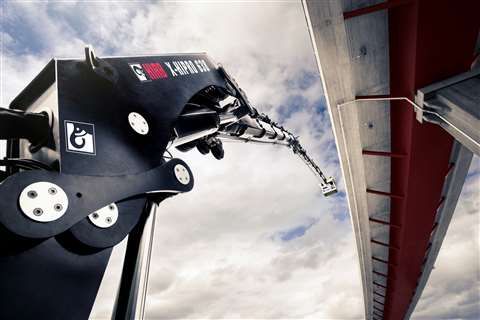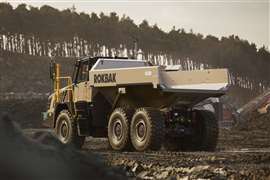Hiab and Cargotec up despite challenges in 2021
23 February 2022
 Hiab sales increased nearly 14 % in 2021
Hiab sales increased nearly 14 % in 2021
Cargotec group sales in 2021 were €3,315 million (US$ 3,762 million), as against €3,263 million ($3,703 million) for the year before.
Sales increased 1.6 per cent in 2021 while orders received was up a massive 42 % on the previous year from €3,121 million ($3,542 million) to €4,427 million ($5,023 million). The discrepancy was explained by Mika Vehviläinen, Cargotec CEO, who said, “Component shortages and global logistics challenges limited our ability to respond to the demand.”
Group operating profit was up 2 % to €232 million ($263 million) from €227 million ($258 million) driven by the Hiab crane division. Hiab sales increased 14 % while at Kalmar and MacGregor there were declines in sales. Service sales increased 7 % from the previous year to €1,076 million ($1,221 million) from €1,005 million ($1,140 million) in 2020.
By division Hiab, with its hydraulic loader cranes and other materials handling equipment, has a 38 % share of the total. In 2021 sales were €1,250 million ($1,418 million), up 14 % from €1,094 million ($1,241 million) in 2020. Operating profit was €166 million ($188 million) or 13 % of sales. It employs 3,585, people.
Port crane and equipment maker Kalmar is the largest of the Cargotec divisions with a 46 % share of the total. Sales in 2021 were €1,512 million ($1,715 million), down -1 % from €1,529 million ($1,734 million) in 2020. Operating profit was €120 million ($136 million) or 8 % of sales. Kalmar has 4,876 employees.
Smallest of the divisions is MacGregor, maker of marine cranes and other cargo equipment. Its 17 % share of the total constituted €553 million ($627 million) in sales for 2021, down nearly -14 % from €642 million ($728 million) in 2020. It posted a loss of €-15 million ($ -17 million). Personnel number 1,909 in this division.
Commenting on the year for the group as a whole, Mika Vehviläinen said, “In 2021, our market situation improved, global economic activity picked up, and the demand for our products and solutions strengthened significantly. As the year progressed, however, component shortages and supply chain challenges delayed our deliveries. The continuing Covid-19 pandemic also hampered both our operations and those of our customers.”
Geographically Cargotec gets half its business from Europe, the Middle East and Africa (EMEA), 31 % from the Americas and 19 % comes from the Asia-Pacific region.
Looking ahead Vehviläinen said the order book is strong but he expects component shortages and global logistics challenges to continue and that they may limit Cargotec’s ability to respond to the growing demand.
STAY CONNECTED


Receive the information you need when you need it through our world-leading magazines, newsletters and daily briefings.
CONNECT WITH THE TEAM











